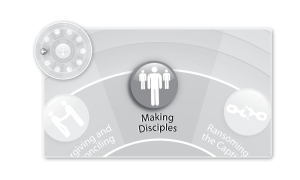Part I of our series on Making Disciples
 When you hear the word “discipleship” what do you think of?
When you hear the word “discipleship” what do you think of?
Many go right to Jesus and his calling of twelve men to serve as his disciples. We tend to think of Jesus as the pioneer of discipleship.
Surprisingly, however, Jesus is continuing a model already fully developed in the Old Testament. This is best observed in the relationship between Elijah and Elisha, the great prophets of Israel.
So Elijah went from there and found Elisha son of Shaphat. He was plowing with twelve yoke of oxen, and he himself was driving the twelfth pair. Elijah went up to him and threw his cloak around him. Elisha then left his oxen and ran after Elijah. “Let me kiss my father and mother good-by,” he said, “and then I will come with you.”
“Go back,” Elijah replied. “What have I done to you?”
So Elisha left him and went back. He took his yoke of oxen and slaughtered them. He burned the plowing equipment to cook the meat and gave it to the people, and they ate. Then he set out to follow Elijah and became his attendant. (1 Kings 19:19–21)
Spangler and Tverberg write a lot about this in their book, Sitting at the Feet of the Rabbi Jesus. They point out that Jesus uses “the plow of Elisha” in Luke 9:61-62 as the model for how he expects his own disciples to abandon everything to follow him:
Still another [disciple] said, “I will follow you, Lord; but first let me go back and say good-by to my family.”
Jesus replied, “No one who puts his hand to the plow and looks back is fit for service in the kingdom of God.”
Here’s a great quote from the Spangler and Tverberg book:
Several aspects of Elisha’s life exemplified discipleship in Jesus’ time. First of all, Elisha went to live with Elijah, spending year after year with him. That made sense in light of the fact that the goal wasn’t just academic learning but personal transformation. As the Jewish historian Shmuel Safrai explains it, a disciple ‘did not grasp the full significance of his teacher’s learning in all its nuances except through prolonged intimacy with his teacher, through close association with his rich and profound mind.’ To that end, the disciple would accompany the rabbi on all of his daily rounds: going to court, helping the poor, burying the dead, redeeming slaves, and so on. The disciple sought to be a humble and caring companion doing personal acts of service and helping the teacher in all things.
So the teacher/disciple relationship is hierarchical.
But don’t get the idea that the teacher gets treated like God and the disciple gets treated like trash. The leader is still the leader, but the leader is now, in the imitation of Christ, voluntarily the slave of the slave. This was certainly the case in Jesus’ relationship with his own disciples, too, as noted by Spangler and Tverberg:
The Gospels make it clear that Jesus’ disciples also served him. They went into town to buy food (John 4:8), and they arranged for the Passover celebration according to his directions (Luke 22:8). Disciples were expected to take turns preparing the common meal and serving the needs of the group.
In that sense, Jesus wasn’t doing anything new.
But what is new is Jesus’ mirroring to his disciples a fundamentally different character of relationship between the teacher and his students…which we’ll look at in our next post!
In the meantime, take a moment to answer the question we began with: when you hear the word “discipleship” what comes to mind for you and why?











Pingback: Four Elements for Every Discipleship Conversation | Rev. Eric Foley
Why is it that so many young people find it difficult to put aside their secular jobs to answer to Christ’s specific call to them for full- time ministry today?
I would still like to know as to where and when Elisha was born, his livelihood, why Elija was keen to get the service of Elisha, the exact reason for God to take up Elija.
Maybe one day we will learn together when Christ comes back!
Hello 린다 자매님!
You may not have had the experience of going to live with someone to learn from them, or having someone come live with you in order to learn from you (although I can think of some examples of more short-term versions of this in your life!), but one big discipleship relationship you may be overlooking in your life is your marriage!
What do you think?